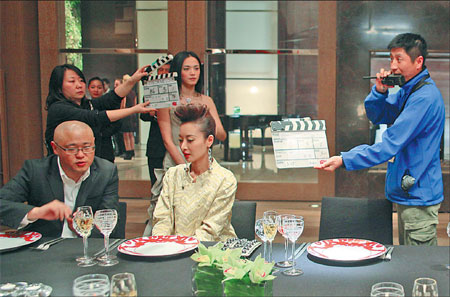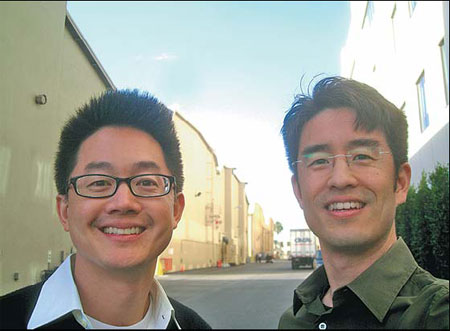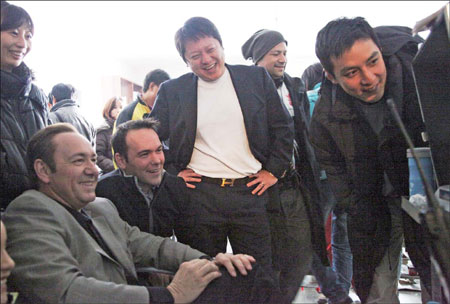Hints From Hollywood
Updated: 2012-04-27 10:37
By Zhou Liming (China Daily)
|
|||||||||||
Hollywood movies attract a huge amount of attention in China, but those Chinese who have worked inside the US system and are now setting up shop as part of the country's film industry have largely been flying under the radar.
Take Ben Ji as an example. For much of the 1990s, he represented Disney in marketing and distribution to the Chinese market. The Rock, which starred Nicolas Cage and Sean Connery, made a huge splash in China after Ji successfully pitched the project to the distributor, China Film Group. "The fast tempo was refreshing to Chinese audiences," he recalls.
However, Ji reveals that many features in the drama genre have difficulty drawing a sizable audience because of differences in cultural background, social ethics and other factors.
The international politics involved in Enemy of the State, another Disney release, might have been off-putting for Chinese moviegoers, according to Ji. "This type of story may do better now, given the growing knowledge about the outside world."
After attending the University of Southern California and working for Warner Bros Pictures International, Ji moved to China and produced three feature films starring some of the country's biggest cinematic names, such as Ge You, Joan Chen, Liu Ye and Yao Chen. The magical pairing of Wen Zhang and Bai Baihe in last year's sleeper hit Love Is Not Blind started as one of a quartet of urban romances in the Ji production The Law of Attraction.
But Ji is not alone in forsaking a Hollywood career in pursuit of greener pastures in the Middle Kingdom. Many others in the sector who did not grow up in China have come to establish themselves in the country's burgeoning film industry that in 2010 reached the milestone of 10 billion yuan ($1.5 billion; 1.2 billion euros) in box office revenue and has an annual growth rate of 30 percent.
By Ji's estimate, some 100 returnees are involved in both the creative and management areas of the Chinese film business, each with the advantage of firsthand expertise in what is arguably the world's most advanced cinematic industry. They are plowing what they learned in Hollywood back into the land of new adventures.
Those who trained in the US and have since moved to China "will make a big difference to China's film industry", says Stanley Rosen, director of the East Asian Studies Center at the University of Southern California's College of Letters, Arts and Sciences, and they will remedy some of the weaknesses, the biggest of which is "the lack of good producers".
"In addition, the returnees will be presented with opportunities not previously available, because of recent deals with such companies as Disney and DreamWorks," according to Rosen. They "will play a bridging role, particularly in areas such as storytelling, marketing and distribution".
 |
|
Ben Ji (left) on the set of Color Me Love with Yao Chen (at the back) and Zhu Hong (in yellow).[Photos Provided to China Daily] |
Last week, it was announced that a Chinese company, DMG Entertainment, will invest 1 billion yuan in the production of Iron Man 3, and will distribute the film in China in collaboration with Disney.
In 2007, Christopher DeHau Lee helped to launch the entertainment division of DMG, before leaving last year to set up his own company, Move Eye Media, with his brother Dickson.
The brothers were raised in Los Angeles. They started at the bottom of the Hollywood ladder with internships at various companies in the 1990s before going on to work at production companies and studios such as Sony, Disney, Paramount, MGM, DreamWorks and Will Smith's Overbrook Entertainment.
"I read more than 1,000 scripts from every genre during my 10 years in Hollywood," says Christopher, the younger brother. "That was the best training I received."
Out of every 100 scripts, only 1 percent won approval for development and even fewer were actually produced. That selection process honed Lee's skills in all kinds of genres, from sci-fi to romance.
He is now preparing to direct a self-penned comedy about the love-hate relationship between dogs and people in modern-day China. Called Doggie Says I Love You, it's an official project selection of the 2012 Beijing International Film Festival Co-Production Forum.
Lee is also part of the production team of another official festival project called Gods.
"The most important thing I learned in Hollywood was integrity, including creative integrity. With so much focus on budgets and box office, movies have to be relevant and realistic, with the ability to impact and entertain people," he says.
"Two of the Chinese filmmakers I had my eye on for future collaboration before I came to China in 2007 were Ning Hao and Xu Jinglei. I've now worked with and learned a lot from both of them and hope to emulate their success in China as well as back in my hometown, LA."
For more than 10 years, Dickson, the elder brother, worked as a Sony Studios executive in studio operations strategy, finance and operations, in addition to five years at the Disney Company in its international home video and Internet divisions. His corporate affairs experience has armed him with both the knowledge and the management tools for the modern film business. "One has to treat any film project like a business," he said, emphasizing the "checks and balances" that should be present to mitigate risks. "We hope we can be the next Warner or Huayi Brothers, but bilingual," said Chris.
David U. Lee, no relation to the brothers, grew up in Taiwan and started his Hollywood career as an intern at Miramax. Having worked at three Hollywood companies before settling down on the Chinese mainland, he revealed that the competitiveness of the environment is the ultimate driving force in his career. "I have no family connections, no reasons to be in showbiz. In Hollywood I had to figure people out and focus on how to be competitive."
However, not everything that works in Hollywood can or should be replicated in China. For example, the agency model has failed to take off in China, according to Ben Ji. In Hollywood, an agency can put together a package that includes a story idea with top talent attached and sell it to a studio.
Here in China, there is one giant State-owned studio and half a dozen private ones that are coming of age, plus many fly-by-night operations. "Nobody is going to buy your package," says Ji. That factor may explain the difficulties encountered by the Chinese branch of the Creative Artists Agency, a top Hollywood agency.
 |
|
The Lee brothers, on the Sony backlot. Dickson is on the left and Christopher on the right. |
Today's Top News
Rescuers race against time for quake victims
Telecom workers restore links
Coal mine blast kills 18 in Jilin
Intl scholarship puts China on the map
More bird flu patients discharged
Gold loses sheen, but still a safe bet
US 'turns blind eye to human rights'
Telecom workers restore links
Hot Topics
Lunar probe , China growth forecasts, Emission rules get tougher, China seen through 'colored lens', International board,
Editor's Picks

|

|

|

|

|

|






